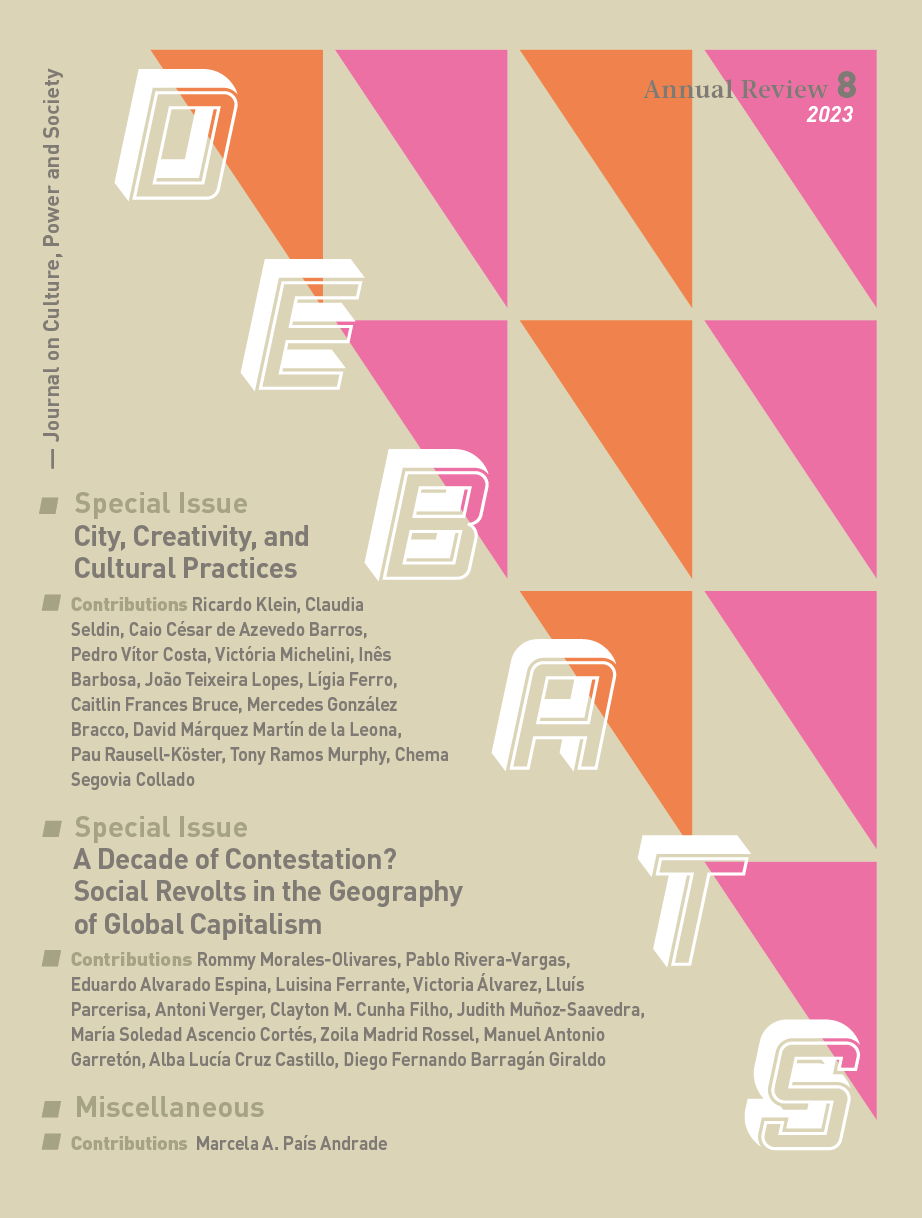#(Trans)Feminist Movement #COVID-19. From Territorial to Virtual Dialogue in Cultural / Artistic Experiences in Argentina and Spain
Resum
This paper analyses the narratives, practices and strategies articulated in (trans) Feminist artistic/cultural experiences in Argentina and Spain seen in the context of COVID-19 from three dimensions: Ethical, Aesthetic, Political. It is framed within a socio-anthropological research study that was carried out between June 2020 and June 2022. The study charted the tensions and agreements between (trans) Feminist social movements and the daily practices of various artists and people holding management positions in the cultural field in Argentina and in Spain. The findings cover: (1) the ethical implications of resisting, challenging and negotiating expected socio-cultural practice; (2) a community’s ways of being and doing; (3) resignification of the senses of the cultural and the generic as spaces of the everyday and of political experimentation (re)producing different ways of tackling and shaping the world; (4) grasping the intersections between The State and citizens’ rights in specific communities; (5) new ways of doing Social Research in the cultural field.
Descàrregues
Referències
Abéles, M. (1997). La antropología política: nuevos objetivos, nuevos objetos. Revista Internacional de Ciencias Sociales,
-26 (online). https://omegalfa.es/downloadfile.php?file=libros/la-antropologia-politica-nuevos-objetivosnuevos-
objetos.pdf Consulted on 28th July 2022.
Achilli, E. (2005). Investigar en antropología social. Los desafíos de transmitir un oficio. Rosario: Laborde Editor.
Atkinson, P. (2006). Do It Yourself: Democracy and Design. Introduction to special issue, 19(1), 1-10. DOI: 10.1093/
jdh/epk001
Barrancos, D. (2014). Géneros y sexualidades disidentes en la Argentina: de la agencia por derechos a la legislación
positiva. Cuadernos intercambio sobre Centroamérica y el Caribe, 11(2), 17-46 (online). https://ri.conicet.gov.ar/
bitstream/handle/11336/7099/CONICET_Digital_Nro.9670_A.pd Accessed 28th July 2022.
Bennet, J. (2010). The force of things. Vibrant Matter: A Political Ecology of Things (pp. 1-9). United States: Duke
University Press (John Hope Franklin Center Book).
Bourdieu, P. (1990). Sociología y Cultura. Mexico, D. F: Grijalbo-Consejo Nacional para la Cultura y las Artes.
Bourdieu, P. (1993). Espíritus del Estado. Génesis y estructura del campo burocrático. Actes de la Recherche en Sciences
Sociales, N° 96-97, 49-62 (online). https://www.persee.fr/doc/arss_0335-5322_1993_num_96_1_3040 Accessed
th July 2022.
Butler, J. (2009). Performatividad, precariedad y políticas sexuales. AIBR. Revista de Antropología Iberoamericana, 4(3),
- 336 (online). https://www.redalyc.org/articulo.oa?id=62312914003 Accessed 28th July 2022.
Butler, J. (2010). Cuerpos que importan. Sobre los límites materiales y discursivos del «sexo». Buenos Aires: Paidós.
Butler, J. (2014). Vida precaria, vulnerabilidad y ética de cohabitación. Cuerpo, memoria y representación. Adriana
Cavarero y Judith Butler en diálogo (pp.47-80). Barcelona: Icaria, Begonya Saez Tajafuerce.
Butler, J. (2017). Cuerpos aliados y lucha política. Buenos Aires: Paidós.
Crenshaw, K. (1989). Demarginalizing the Intersection of Race and Sex: A Black Feminist Critique of Antidiscrimination
Doctrine, Feminist Theory and Antiracist Politics. University of Chicago Legal Forum (online).https://chicagounbound.
uchicago.edu/uclf/vol1989/iss1/8 Accessed 28th July 2022.
Foucault, M. (1978). Seguridad, territorio y población, Paris: Siglo XXI.
Franko, M. (2019). Danzar el modernismo / Actuar la política. Buenos Aires, Ed. Miño and Dávila.
Frasser, N. (2006). La justicia social en la era de la política de la identidad: redistribución, reconocimiento y
participación. N. Frasser, N. and A. Honneth, ¿Redistribución o reconocimiento? Un debate político filosófi¬co
(pp. 83-99). Spain: Ed. Morata.
Fraser, N. (2009). Feminism, Capitalism and the Cunning of History. New Left Review, (56), 97-117 (online).
Consulted 3rd August 2022.
Gargallo Celantani, F. (2014). Feminismos desde Abya Yala. Ideas y Proposiciones de las Mujeres de 607 Pueblos de Nuestra
América, Mexico City, Ed. Corte y Confección.
Grossberg, L. (2010). Pecados de los estudios culturales. Estudios culturales. Teoría, política y práctica (pp. 55-105).
Valencia: Letra capital.
Guber, R. (1991). El salvaje metropolitano. Buenos Aires, Argentina: Editorial Legasa.
Hall, S. (1992). Estudios culturales y sus legados teóricos. Sin garantías. Trayectorias y problemáticas en estudios culturales
(pp.51-72). Popayán-Lima-Quito: Envión Editores-IEP- Instituto Pensar-Universidad Andina Simón Bolívar.
Haraway, D. J. (1995). Conocimientos situados: la cuestión científica en el feminismo y el privilegio de la perspectiva
parcial. Ciencia, cyborgs y mujeres. La invención de la naturaleza (pp. 313-346). Madrid: Cátedra.
Hubbell, L. (2011). DIY Craft: Therapy, Irony or Handmade Hell? Surface Design Journal. 2, 48-53.
Korol, C. and Castro, G. C. (2016). Feminismos Populares. Pedagogías y Políticas. Colombia: La Fogata editorial and
Argentina: América Libre.
Lorey, I. (2016). Estado de inseguridad. Gobernar la precariedad. Madrid: Traficantes de Sueños.
Lugones, M. (2008). Colonialidad y género. Tabula Rasa. No.9, 73-101 (online).
https://www.revistatabularasa.org/numero-9/05lugones.pdf Accessed 28th July 2022.
Lukens, J. (2013). DIY Infrastructure and the Scope of Design Practice. Design Issues. 29 (3), 14-27.
Descàrregues
Publicades
Com citar
Número
Secció
Llicència
Sense perjudici del que disposa l'article 52 de la Llei 22/1987 d'11 de novembre de Propietat Intel·lectual, BOE del 17 de novembre de 1987, i conforme a aquest, els/les autors o autores cedeix/en a títol gratuït els seus drets d'edició, publicació, distribució i venda sobre l'article, per tal que siga publicat a Debats. Revista sobre cultura, poder i societat.
Debats. Revista de cultura, poder i societat es publica sota el sistema de llicències Creative Commons segons la modalitat “Reconeixement – NoComercial (by-nc): Es permet la generació d’obres derivades sempre que no se’n faça un ús comercial. Tampoc no es pot fer servir l’obra original amb finalitats comercials”.
Així, quan l’autor/a envia la seva col·laboració, accepta explícitament aquesta cessió de drets d’edició i de publicació. Igualment autoritza Debats. Revista de cultura, poder i societat la inclusió del seu treball en un fascicle de la revista perquè es puga distribuir i vendre.











